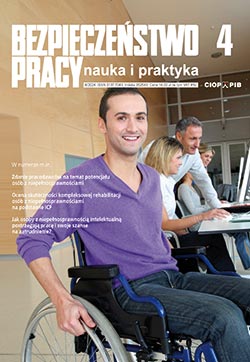Seafarers’ safety and health at work
Iouri N. Semenov
This article examines the organizational and legal system of seafarers’ safety. It discusses the causes of accidents and identifies risk factors for the loss of seafarers' life or health at sea. The article pays spacial attention to the causes of the crew's errors. The conclusion is that the new Maritime Labour Convention contributes to an increase in the level of seafarers’ safety.
Psychoactive traffic users
Jadwiga Bąk, Dorota Bąk-Gajda
This article presents basic elements that add up to traffic users' capableness (e.g., spatial vision, night vision, reaction time) from the point of view of transport psychology (with additional weight laid in work safety in transport). We stress the impact of psychoactive substances on that capability and, to do so, we discuss the impact of alcohol and drugs in the context of a driver’s performance.
Provisions on personal data of employees in the process of recruitment and employment
Karolina Aromińska
An employer who employs workers is obliged to comply with the provisions on the protection of personal data, which obliges compliance with all provisions applicable to both the recruitment process and after an employee has been employed. They are included in Constitution, the Labour Code and the Civil Code. Systematic interpretation of Article 51 of the Constitution, Article 221 of the Labour Code and Articles 23, 415 of the Civil Code indicate that the candidate is not required to disclose all personal information requested by the employer during the recruitment process, but only the data listed in it. In the case of an employee, the employer has the right to demand the above-mentioned personal data and, additionally, a wider range of other data (the employee's PESEL, information on the employee's children, if this is necessary due to the employee's specific rights, and other personal data if the obligation to provide them results from separate regulations). When asking for personal data, the employer is always obliged to comply with the prohibition of discrimination, and if the employer intends to process personal data, this is possible only after the employee has expressed voluntary consent. Failure of due diligence in this regard carries both civil and criminal liability.
Impact of sound absorbing suspended ceilings on acoustics in classrooms
Witold Mikulski
This article presents the results of measurements of reverberation time and speech transmission index STI in eight typical school classrooms before and after suspended ceilings have been installed. Without those ceiling, the rooms did not fulfil acoustic conditions, i.e., reverberation time was too long and, at the same time, only two classrooms had minimum speech intelligibility. It follows that before acoustic treatment, the classrooms did not provide good learning conditions. After acoustic treatment, the acoustic conditions radically improved, as the measured values of reverberation time and speech transmission index STI showed; they now satisfied the specified criteria. Moreover, the acoustic properties of the classrooms improved so much that four classrooms had excellent intelligibility and the other four good, near-excellent intelligibility.
Preventing work-related musculoskeletal disorders: physical activity at work (1)
Marzena Malińska
This article discusses work-related musculoskeletal disorders and makes recommendations regarding preventing those disorders with physical activity. It also presents information of programs promoting physical activity at work as well as their effectiveness.




























